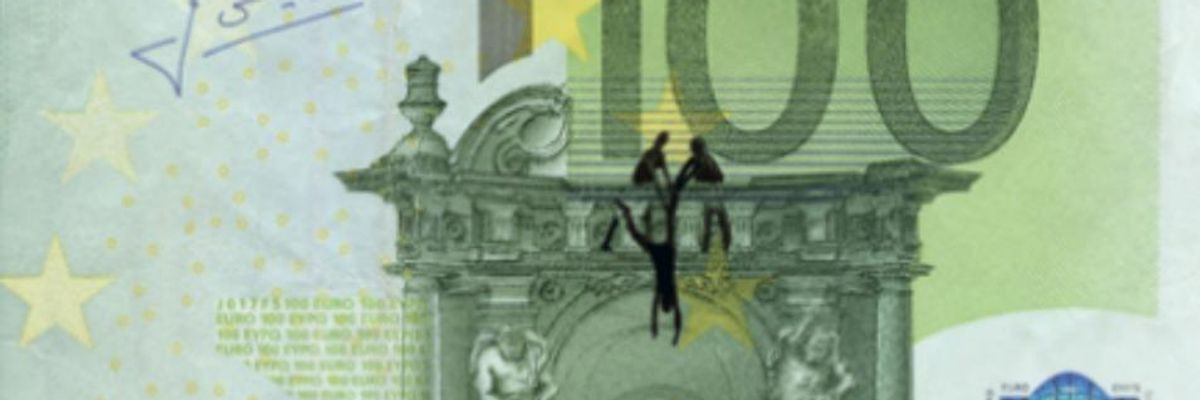

SUBSCRIBE TO OUR FREE NEWSLETTER
Daily news & progressive opinion—funded by the people, not the corporations—delivered straight to your inbox.
5
#000000
#FFFFFF
To donate by check, phone, or other method, see our More Ways to Give page.


Daily news & progressive opinion—funded by the people, not the corporations—delivered straight to your inbox.

"They have decided to strangle us, whether we say yes or no", said a Greek woman to me yesterday. "The only choice we have is to make it quick or slow. I will vote "oxi" (no). We are economically dead anyway. I might as well have my conscience clear and my pride intact."
Her view is not atypical among friends and relations I have canvassed in the last few days. Trust has evaporated. Faith in European Institutions is thin on the ground. Lines have been crossed. At times of financial strain, a country's currency issuer, its central bank, should act as lender of last resort and prime technocratic negotiator. In Greece's case, the European Central Bank, sits on the same side as the creditors; acts as their enforcer. This is unprecedented.
The ECB has acted to asphyxiate the Greek economy - the ultimate blackmail to force subordination. The money is there, in our accounts, but we cannot have access to it, because the overseers of our own banking system, the very people who some months ago issued guarantees of liquidity, have decided to deny liquidity. We have phantom money, but no real money. There is a terrifying poetry to that, since the entire crisis was caused by too much phantom money in the first place.
Read the complete version of this article, and support quality analysis of the ongoing crisis in Greece, at the Byline.
Political revenge. Mass deportations. Project 2025. Unfathomable corruption. Attacks on Social Security, Medicare, and Medicaid. Pardons for insurrectionists. An all-out assault on democracy. Republicans in Congress are scrambling to give Trump broad new powers to strip the tax-exempt status of any nonprofit he doesn’t like by declaring it a “terrorist-supporting organization.” Trump has already begun filing lawsuits against news outlets that criticize him. At Common Dreams, we won’t back down, but we must get ready for whatever Trump and his thugs throw at us. As a people-powered nonprofit news outlet, we cover issues the corporate media never will, but we can only continue with our readers’ support. By donating today, please help us fight the dangers of a second Trump presidency. |
"They have decided to strangle us, whether we say yes or no", said a Greek woman to me yesterday. "The only choice we have is to make it quick or slow. I will vote "oxi" (no). We are economically dead anyway. I might as well have my conscience clear and my pride intact."
Her view is not atypical among friends and relations I have canvassed in the last few days. Trust has evaporated. Faith in European Institutions is thin on the ground. Lines have been crossed. At times of financial strain, a country's currency issuer, its central bank, should act as lender of last resort and prime technocratic negotiator. In Greece's case, the European Central Bank, sits on the same side as the creditors; acts as their enforcer. This is unprecedented.
The ECB has acted to asphyxiate the Greek economy - the ultimate blackmail to force subordination. The money is there, in our accounts, but we cannot have access to it, because the overseers of our own banking system, the very people who some months ago issued guarantees of liquidity, have decided to deny liquidity. We have phantom money, but no real money. There is a terrifying poetry to that, since the entire crisis was caused by too much phantom money in the first place.
Read the complete version of this article, and support quality analysis of the ongoing crisis in Greece, at the Byline.
"They have decided to strangle us, whether we say yes or no", said a Greek woman to me yesterday. "The only choice we have is to make it quick or slow. I will vote "oxi" (no). We are economically dead anyway. I might as well have my conscience clear and my pride intact."
Her view is not atypical among friends and relations I have canvassed in the last few days. Trust has evaporated. Faith in European Institutions is thin on the ground. Lines have been crossed. At times of financial strain, a country's currency issuer, its central bank, should act as lender of last resort and prime technocratic negotiator. In Greece's case, the European Central Bank, sits on the same side as the creditors; acts as their enforcer. This is unprecedented.
The ECB has acted to asphyxiate the Greek economy - the ultimate blackmail to force subordination. The money is there, in our accounts, but we cannot have access to it, because the overseers of our own banking system, the very people who some months ago issued guarantees of liquidity, have decided to deny liquidity. We have phantom money, but no real money. There is a terrifying poetry to that, since the entire crisis was caused by too much phantom money in the first place.
Read the complete version of this article, and support quality analysis of the ongoing crisis in Greece, at the Byline.